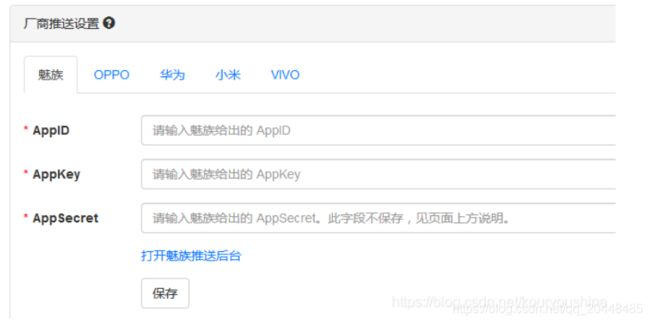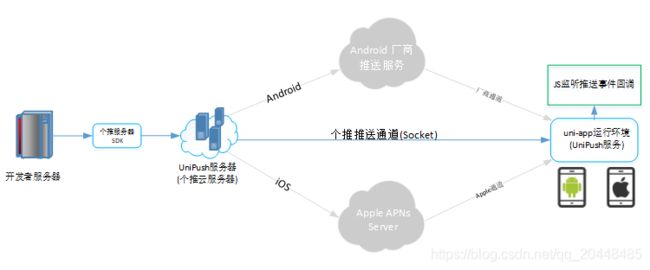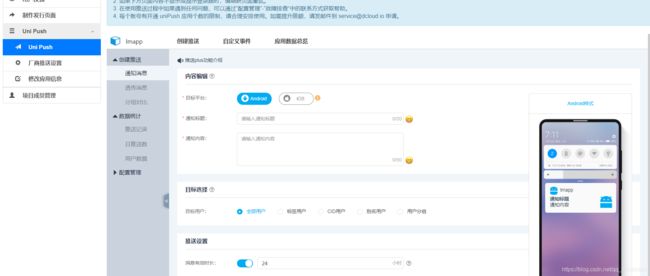uni-app unipush + 个推 实现推送服务全过程(干货)
背景
说明文档这个事情官方应该提供出来,可惜官方觉得是多余的,免费的东西凭啥给你做好。于是我在这里叙述一下实现消息通知推送的步骤。
uni-app官方文档入口
https://uniapp.dcloud.io/api/plugins/push
uniPush官方使用指南
https://ask.dcloud.net.cn/article/35622
个推官方文档入口
https://docs.getui.com/
推送H5+API接口:
https://www.html5plus.org/doc/zh_cn/push.html
一、流程
1.第三方应用集成个推SDK,个推SDK运行后获取CID返回给第三方应用,由第三方应用保存至其应用服务器;
2.第三方应用服务器调用推送API进行消息推送,个推SDK将接收到的推送消息回调给App进行处理。
二、推送方式
个推提供JAVA、C#、PHP、Python等多种语言版本的服务端API SDK,可以和各种第三方应用服务器技术架构进行对接。为了最大程度提高消息推送性能,第三方开发者需要根据业务需求合理选择消息推送形式。如果是针对每 个用户进行定制化的消息推送、或是实现类似IM的点对点消息,请采用单推消息形式(SingleMessage);如果需要根据特定条件筛选出一批CID 后推送相同的内容,请选择批量推送形式(ListMessage);如果希望针对省市或全量用户进行推送,请选择群推形式(AppMessage)。
通过上面描述已经大概了解个推了,可以单推、批量推、按照筛选条件批量推送,详细更多介绍请参考官方文档:http://docs.getui.com/
三、基础环境准备
2.1 DCLOUD平台配置
参考官方教程在dcloud中配置各个厂商的api和secret,这部分不是难点,有问题留言。
https://ask.dcloud.net.cn/article/35716

为啥要配置厂商呢:
为了在app关闭的时候,可以通过厂商的服务器推送消息给手机通知系统。第三方的消息推送会被阻挡,最好的方式就是按照厂商的要求接入各个推送服务。庆幸的事情,这部分DCLOUD已经帮你做好了。你只需要注册下各个厂商的开发平台,按到appid和secret登录dcloud后台即可。

2.1 uni-app权限配置

2.3 准备自定制测试基座或者云打包
Hbuilder的基座配置的信息都是dcloud的,所以用被人的app是没办法测试推送服务的。解决这个问题有两种
1,云打包时打包成为自己的app后测试
2,制作自定义的基座(很简单),这个基座的信息都是自己的,所以可以测试
运行的时候选择自定制基座,或者直接云打包后的的apk安装到手机测试。

温馨提示: 可以先体验 uni push 后台界面推送(帮助理解推送的过程)
四、APP端代码
代码位置只能在app.vue的onLaunch中,其他地方可能会有问题。
//#ifdef APP-PLUS
var info = plus.push.getClientInfo();
console.log( JSON.stringify( info ) );
/* 5+ push 消息推送 ps:使用:H5+的方式监听,实现推送*/
plus.push.addEventListener("click", function(msg) {
console.log("click:"+JSON.stringify(msg));
console.log(msg.payload);
console.log(JSON.stringify(msg));
//这里可以写跳转业务代码
}, false);
// 监听在线消息事件
plus.push.addEventListener("receive", function(msg) {
// plus.ui.alert(2);
//这里可以写跳转业务代码
console.log("recevice:"+JSON.stringify(msg))
}, false);
//#endif
这里就是官方文档比较恶心的地方,自己生命onpush之类的api废弃了,但是给的demo还是用的废弃的方式。推荐的H5+api却不给demo。要知道demo对我们就是api文档啊。
这里listener监听的两种事件
- “click”-从系统消息中心点击消息启动应用事件;
- “receive”-应用从推送服务器接收到推送消息事件。
五、后端代码(java)
5.1个推sdk导入
<dependency>
<groupId>com.gexin.platform</groupId>
<artifactId>gexin-rp-sdk-http</artifactId>
<version>4.1.0.5</version>
</dependency>
<repositories>
<repository>
<id>getui-nexus</id>
<url>http://mvn.gt.igexin.com/nexus/content/repositories/releases/</url>
</repository>
</repositories>
5.2 加入 uin push 应用配置参数,实际中替换为自己的
public static final String AppID = "";
public static final String AppSecret = "";
public static final String AppKey = "";
public static final String MasterSecret = "";
public static final String HOST = "http://sdk.open.api.igexin.com/apiex.htm";
第一个推送方式,也是最常用性能最高的推送,单推:
/**
*
* @param cidOrAlias
* 别名或者cid
* @param msg
* 透传消息内容
* @param type
* 1-cid推,2-别名推
*/
public static void pushToSingle(String cidOrAlias, String msg, int type) {
IGtPush push = new IGtPush(HOST, AppKey, MasterSecret);
ITemplate template = buildTransmissionTemplate(msg);
SingleMessage message = new SingleMessage();
// 是否离线推送
message.setOffline(true);
// 离线有效时间,单位为毫秒,可选
message.setOfflineExpireTime(24 * 3600 * 1000);
// 消息内容
message.setData(template);
// 可选,1为wifi,0为不限制网络环境。根据手机处于的网络情况,决定是否下发
message.setPushNetWorkType(0);
Target target = new Target();
target.setAppId(AppID);
if (type == 1) {
target.setClientId(cidOrAlias);
} else if (type == 2) {
// 按别名推送
target.setAlias(cidOrAlias);
}
IPushResult ret = null;
try {
ret = push.pushMessageToSingle(message, target);
} catch (RequestException e) {
e.printStackTrace();
// 推送失败时,进行重推
ret = push.pushMessageToSingle(message, target, e.getRequestId());
}
if (ret != null) {
System.out.println(ret.getResponse().toString());
} else {
System.out.println("服务器响应异常");
}
}
上面有详细的注释,有几个需要注意几个地方。
推送的消息类型,支持各种模板,有通知栏透传模板,通知栏点击跳转网页模板,透传模板等,下面列举示例
1、通知栏点击跳转网页模板:
public static LinkTemplate buildLinkTemplate() {
LinkTemplate template = new LinkTemplate();
// 设置APPID与APPKEY
template.setAppId(AppID);
template.setAppkey(AppKey);
Style0 style = new Style0();
// 设置通知栏标题与内容
style.setTitle("请输入通知栏标题");
style.setText("请输入通知栏内容");
// 配置通知栏图标
style.setLogo("icon.png");
// 配置通知栏网络图标
style.setLogoUrl("");
// 设置通知是否响铃,震动,或者可清除
style.setRing(true);
style.setVibrate(true);
style.setClearable(true);
template.setStyle(style);
// 设置打开的网址地址
template.setUrl("http://www.baidu.com");
return template;
}
通过这种方式推送,手机上会收到一条通知栏消息,点击后会打开指定网页。
2、通知栏透传模板
public static NotificationTemplate buildNotificationTemplate() {
NotificationTemplate template = new NotificationTemplate();
// 设置APPID与APPKEY
template.setAppId(AppID);
template.setAppkey(AppKey);
Style0 style = new Style0();
// 设置通知栏标题与内容
style.setTitle("群推通知栏标题");
style.setText("群推通知栏内容");
// 配置通知栏图标
style.setLogo("icon.png");
// 配置通知栏网络图标
style.setLogoUrl("");
// 设置通知是否响铃,震动,或者可清除
style.setRing(true);
style.setVibrate(true);
style.setClearable(true);
template.setStyle(style);
// 透传消息设置,1为强制启动应用,客户端接收到消息后就会立即启动应用;2为等待应用启动
template.setTransmissionType(2);
template.setTransmissionContent("请输入您要透传的内容");
return template;
}
通过这种方式,手机上会收到一条通知栏消息,并且带有透传消息。
3、纯透传模板:
public static NotificationTemplate buildNotificationTemplate() {
NotificationTemplate template = new NotificationTemplate();
// 设置APPID与APPKEY
template.setAppId(AppID);
template.setAppkey(AppKey);
Style0 style = new Style0();
// 设置通知栏标题与内容
style.setTitle("群推通知栏标题");
style.setText("群推通知栏内容");
// 配置通知栏图标
style.setLogo("icon.png");
// 配置通知栏网络图标
style.setLogoUrl("");
// 设置通知是否响铃,震动,或者可清除
style.setRing(true);
style.setVibrate(true);
style.setClearable(true);
template.setStyle(style);
// 透传消息设置,1为强制启动应用,客户端接收到消息后就会立即启动应用;2为等待应用启动
template.setTransmissionType(2);
template.setTransmissionContent("请输入您要透传的内容");
return template;
}
客户端集成SDK设置监听后,会收到透传消息,客户端可以自己灵活的选择处理方式。
上面还提到按别名推送,那么别名是怎么来的呢
public static void bindAlias(String cid, String alias) {
IGtPush push = new IGtPush(HOST, AppKey, MasterSecret);
IAliasResult bindSCid = push.bindAlias(AppID, alias, cid);
System.out.println("绑定结果:" + bindSCid.getResult() + "错误码:" + bindSCid.getErrorMsg());
}
这是绑定别名的方法,这样通过绑定别名可以和自己的业务数据绑定进行推送。单推就介绍到这里。
第二种推送方式:批量推送:
public static void pushToList(List<String> cids, String msg) {
// 配置返回每个用户返回用户状态,可选
System.setProperty("gexin_pushList_needDetails", "true");
// 配置返回每个别名及其对应cid的用户状态,可选
// System.setProperty("gexin_pushList_needAliasDetails", "true");
IGtPush push = new IGtPush(HOST, AppKey, MasterSecret);
// 透传模板
ITemplate template = buildTransmissionTemplate(msg);
ListMessage message = new ListMessage();
message.setData(template);
// 设置消息离线,并设置离线时间
message.setOffline(true);
// 离线有效时间,单位为毫秒,可选
message.setOfflineExpireTime(24 * 1000 * 3600);
// 配置推送目标
List<Target> targets = new ArrayList<Target>();
Target target = null;
for (String cid : cids) {
target = new Target();
target.setAppId(AppID);
target.setClientId(cid);
targets.add(target);
// target.setAlias(Alias1);
}
// taskId用于在推送时去查找对应的message
String taskId = push.getContentId(message, "任务别名_toApp");
// String taskId = push.getContentId(message);
IPushResult ret = push.pushMessageToList(taskId, targets);
System.out.println(ret.getResponse().toString());
}
这里实际上就是,对一批指定cliendid的用户进行推送,也支持上面的几种模板,参数也可以传别名集合进来。
第三种推送方式,按各种筛选条件进行群推:
public static void pushToApp(String msg, List<String> tagList) throws Exception {
IGtPush push = new IGtPush(HOST, AppKey, AppSecret);
// 使用通知栏链接模板
ITemplate template = buildLinkTemplate();
AppMessage message = new AppMessage();
message.setData(template);
message.setOffline(true);
// 离线有效时间,单位为毫秒,可选
message.setOfflineExpireTime(24 * 1000 * 3600);
// 可选,1为wifi,0为不限制网络环境。根据手机处于的网络情况,决定是否下发
message.setPushNetWorkType(0);
// 全量推送个推控制下发速度在100条/秒,只有toApp支持定速推送。
// message.setSpeed(100);
// 设置指定时间推送
// message.setPushTime("201903271756");
List<String> appIdList = new ArrayList<String>();
appIdList.add(AppID);
message.setAppIdList(appIdList);
// 推送给App的目标用户需要满足的条件
AppConditions cdt = new AppConditions();
// 手机类型
List<String> phoneTypeList = new ArrayList<String>();
phoneTypeList.add("ANDROID");
phoneTypeList.add("IOS");
// 省份
List<String> provinceList = new ArrayList<String>();
// 50000000代表重庆市
provinceList.add("50000000");
// 设置手机类型筛选
cdt.addCondition(AppConditions.PHONE_TYPE, phoneTypeList);
// 设置省份筛选
cdt.addCondition(AppConditions.REGION, provinceList);
// 设置tag筛选
cdt.addCondition(AppConditions.TAG, tagList);
// 交并补
// cdt.addCondition(AppConditions.PHONE_TYPE, phoneTypeList,
// OptType.or);
// cdt.addCondition(AppConditions.REGION, provinceList, OptType.or);
// cdt.addCondition(AppConditions.TAG, tagList, OptType.or);
message.setConditions(cdt);
IPushResult ret = push.pushMessageToApp(message, "任务别名_toApp");
System.out.println(ret.getResponse().toString());
}
几个注意事项:
省份和城市编码,请参考官方文档
定速推送:旨在解决个推群推系统在全量推送时速度过快,导致部分客户服务器连接压力过大的问题。提供接口设置让用户按自身情况控制推送速度,如果未设置则按默认推送速度发送。
定时推送:对单个指定应用的所有用户群发推送消息。该消息可以在用户设定的时间点进行推送。此接口需要开通。
交并补设置:应用群推对于复杂的查询条件新增加的交并补功能,以对应查询语义中的与或非的关系
- 场景:需要发送给城市在A,B,C里面,没有设置tagtest标签,手机型号为android的用户,用条件交并补功能可以实现,city(A|B|C)
&& !tag(tagtest) && phonetype(andriod) - 条件类型(OptType.or 或, OptType.and 与, OptType.not 非)
tag列表:上面有提到tag,tag就是给用户打的标签,可以实现按标签推送,tag的设置方式如下:
public static void setTag(String cid, List<String> tagList) {
IGtPush push = new IGtPush(HOST, AppKey, MasterSecret);
IQueryResult ret = push.setClientTag(AppID, cid, tagList);
System.out.println(ret.getResponse().toString());
}
通过设置标签,所有终端都可以设置一个或者多个标签,进行标签推送时就会实现筛选作用。
群推就介绍到这里。
单推还有一种扩展形式,批量单推,用于一次创建提交多个单推任务。当单推任务较多时,推荐使用该接口,可以减少与服务端的交互次数。
public static void pushBatch(String cid, String content) throws Exception {
IIGtPush push = new IGtPush(HOST, AppKey, MasterSecret);
IBatch batch = push.getBatch();
try {
// 构建透传消息
constructClientTransMsg(cid, content, batch);
// 构建点击通知打开网页消息
constructClientLinkMsg(cid, content, batch);
} catch (Exception e) {
e.printStackTrace();
}
batch.submit();
}
private static void constructClientTransMsg(String cid, String msg, IBatch batch) throws Exception {
SingleMessage message = new SingleMessage();
TransmissionTemplate template = new TransmissionTemplate();
template.setAppId(AppID);
template.setAppkey(AppKey);
template.setTransmissionContent(msg);
// 这个Type为int型,填写1则自动启动app
template.setTransmissionType(1);
message.setData(template);
message.setOffline(true);
message.setOfflineExpireTime(1 * 1000);
// 设置推送目标,填入appid和clientId
Target target = new Target();
target.setAppId(AppID);
target.setClientId(cid);
batch.add(message, target);
}
private static void constructClientLinkMsg(String cid, String msg, IBatch batch) throws Exception {
SingleMessage message = new SingleMessage();
LinkTemplate template = new LinkTemplate();
template.setAppId(AppID);
template.setAppkey(AppKey);
template.setTitle("title");
template.setText("msg");
template.setLogo("push.png");
template.setLogoUrl("logoUrl");
template.setUrl("url");
message.setData(template);
message.setOffline(true);
message.setOfflineExpireTime(1 * 1000);
// 设置推送目标,填入appid和clientId
Target target = new Target();
target.setAppId(AppID);
target.setClientId(cid);
batch.add(message, target);
}
这样就可以实现一次服务端交互,完成多个单推任务,cid也可以是不同的,给不同的终端进行推送,推送内容也可以不同,这里为了简便就取的一样的。
个推java服务端核心API就介绍到这里,官网还有很多辅助API,查询统计,用户,推送结果等等,这里就不一一列举了,有这个需求的请移至官网文档详细阅读。